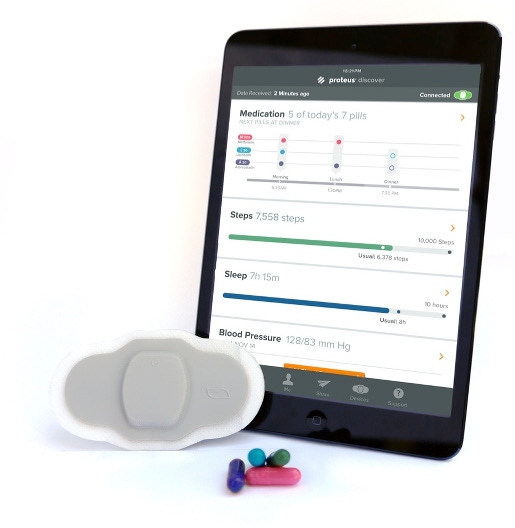More Patients On Digital Medicines Can Lower Blood Pressure
In a pilot study, patients using digital therapies with high blood pressure and type 2 diabetes were able to lower their blood pressure and bad cholesterol more than patients on regular care.
April 5, 2016

The Proteus Discover product includes medication which incorporates an ingestible sensor, a wearable patch and related patient apps |
Hypertension or more specifically drug-resistant hypertension and type 2 diabetes are chronic conditions that are difficult to treat but wearable and digital technology seem to be making a dent.
Interim data on a pilot study presented at the recently-concluded annual meeting of the American College of Cardiology In Chicago shows that patients using Proteus Discover -- a digital solution -- were able to lower their blood pressure and low-density lipoprotein-cholesterol (LDL), and were more likely to achieve their blood pressure goal than those on standard care. High blood pressure and LDL cholesterol are of course known to affect heart health.
The Proteus Discover, developed by Proteus Digital Health, is a solution that comprises a drug which contains and ingestible sensor that communicates to a wearable patch information on when the drug was taken as well as measuring heart rate, activity levels and rest. Patients, caregivers and providers can use related apps and to see their personal record of medication usage as well as physiological data. Providers can view the results through an online portal which shares the insights helping them to modify and optimize patient care. Executives at Proteus Digital Health believe that the digital aspect of the solution - the apps and wearable technology that help to collect, transmit and visualize the data, provide a level of patient engagement and medication adherence that are difficult to achieve through regular care.
To understand how digital therapies have the potential to change outcomes, attend, BIOMEDevice Boston, April 13-14. Kevin Young from the Continuum Innovation will speak about how to embrace technology to improve outcomes |
In the 12-week study of 96 patients who had uncontrolled high blood pressure and type 2 diabetes, were randomized to receive Proteus Discover for four or 12 weeks, or get regular treatment. The primary outcome measure was to lower blood pressure at week four with secondary measures of changes in diastolic blood pressure and the proportion of patients at the target blood pressure of less than 140/90 mm Hg.
By the fourth week 85% of the 72 patients on the digital medicine arm had achieved their blood pressure target compared with 33% of the remaining 24 patients who were receiving the standard of care. Digital medicine patients were also able to lower their systolic and diastolic blood pressure more compared with those who got the usual care. Proteus Discover was also better in terms of lowering bad cholesterol given that the baseline mean levels for the treatment group was 110±4 compared with 97±5 mg/dL for the control arm and the digital therapy was able to bring LDL down by 18±7 versus 1±2 for patients on standard care.
"The promising results from the pilot study demonstrate that this innovative digital approach to therapy optimization is not only patient-centered, but can lead to improved clinical outcomes," said George Savage, Chief Medical Officer of Proteus Digital Health. "The findings suggest that deploying a panel of medicines that reflect the needs of patients and physicians can move the needle in treatment optimization."
Final results will be published later in the year.
Previous studies of hypertension have showed that the Proteus solution works well on patient who don't respond to drugs. In an interview in September, Andrew Thompson, the CEO of Proteus, pointed to studies where patients with uncontrolled hypertension on more than two drugs for six months who were regarded as not responsive to therapy showed remarkable results when put on Proteus' therapy. About 40% of those patients were shown to have better control of their disease.
"Most people would assume that it is an adherence effect but it certainly is a very powerful outcomes effect," he said.
[Photo Credit: Proteus Digital Health]
Arundhati Parmar is senior editor at MD+DI. Reach her at [email protected] and on Twitter @aparmarbb
You May Also Like


